1849: On The Government of Colonies
December 16, 2019
By AHNZ
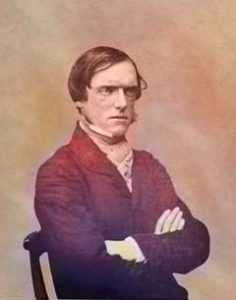
On December 13th, 1849, John Godley and his wife Charlotte embarked on a journey to the other side of the world. They departed England for New Zealand, there to create a new Anglican Utopia.
Christmas 1849 was spent passing Madeira¹, off the coast of Africa, with a long way yet to travel. By 16 December, 1850, the leaders of Canterbury colony were welcoming ship-loads of ‘Pilgrim’ settlers for a Christmas together in the new country.
Godley’s fellows were a High Dignity Culture people whose Old World had become unbearably uncivilised to them. When the same had happened 200 years previous this Anglican stock departed old England for New England: For Virginia, Massachusetts, and Pennsylvania. Here, they set up their own independent territory at their own expense.
“As a matter of course, colonies enjoying, as those of New England did, the perfect administration of their own affairs, ought not to cost the Mother-country a shilling for their government; and I am confident that, like Massachusetts and Pennsylvania of old, they would regard total pecuniary independence of the Mother-country as an important means of preserving their municipal privileges.”- On The Government of Colonies; John Godley
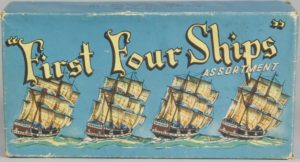 In 1850 the bug-out destination was New Zealand. England, you see, had once again become thick with r-selected Victimhood Culture and Slave Culture hegemony. Rather than stick around to endure the 1850s Clown World, Godley and his Canterbury Pilgrims hit the waves. The day before sailing away, Godley issued a pamphlet that would be a manifesto not only for Canterbury but all of Her Majesty’s Colonies.
In 1850 the bug-out destination was New Zealand. England, you see, had once again become thick with r-selected Victimhood Culture and Slave Culture hegemony. Rather than stick around to endure the 1850s Clown World, Godley and his Canterbury Pilgrims hit the waves. The day before sailing away, Godley issued a pamphlet that would be a manifesto not only for Canterbury but all of Her Majesty’s Colonies.
On The Government of Colonies
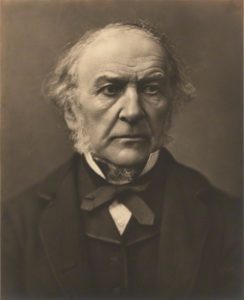
Godley’s renowned missive was an open letter to William Gladstone (image right)- future Prime Minister of the UK but at this time the Opposition’s shadow Secretary of State for War and the Colonies. It sets the scene for the relationship of Britain and her colonies.
The Despotism of the Colonial Office
We have “…made Colonies effeminate by our protection, and disaffected by our tyranny…they are spoiled by Government.” Godly is at great pains to show that Centralism, Micromanaging, from Downing Street is getting in the way of the colonies finding their stride. Indeed, it provokes their defiance.
Like a parent who wont let go, wont allow their chick to leave the nest and launch their own adult life, The State risks turning the (desired) Self Government into (undesired) foreign Independence.
Colonies Already Revolting
The heavy-handed State had already experienced push-back from Canada, New South Wales, and Cape Colony.
“…we cannot govern, or even occupy, a distant colony permanently without the consent of its population.”- Godley
“The more you tighten your grip, Tarkin, the more star systems will slip through your fingers.”- Princess Leia
Canada, “..gained by rebellion nearly all for the sake of which she rebelled..New South Wales, too, has more than once within the last two years repulsed the aggressions of the Colonial Minister.”- Godley
These rebellions in Canada² a decade before were also influential in the Durham Report and its author’s (Lambton & Wakefield) interest in New Zealand. Cape Colony, only weeks before, had rebelled against Downing Street and their Governor over the initiative to turn them into a convict settlement; It was a fight they won.
Responsible Self-Government
Godley, who had toured the colonies and knew them well, spoke for a Colonial Empire that loved being British. The idea of giving colonies freedom was not that they would become estranged from Home but that they would love it, freely, all the more; If you love something, set it free…
“..the alternative has hitherto appeared to lie between local self-government and the centralism of Downing Street, now it is between local self-government and national independence.”
“I do not mean, then, mere powers of paving and lighting, and road making; nor the privilege of initiatory legislation; nor the liberty of making subordinate official appointments..or any other of those provisions in virtue of which Ministers in Downing Street are in the habit of interfering with ..I mean by local self-government the right and power to do,…without check, control, or intervention of any kind, everything that the supreme Government of this country can do within the limits of the British Islands—with one exception.”
Godley insisted that colonies, like the one he was leaving to create in Canterbury, write their own constitutions and rules in all things. The one exception being foreign relations which ought to remain one voice from Downing Street.
The Breaking of the British Empire
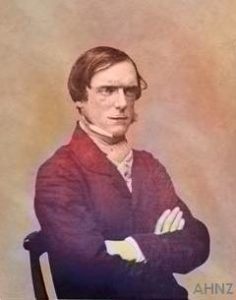 Godley and the Canterbury Pilgrims loved Britain and their flag. They had no interest in colonising anything if it involved ever being separated from their Mother Country. The measures suggested were not intended to break up the British Empire but to save it…”…it will be decided whether “the British Empire” is to endure and to grow, as it has hitherto grown, for an indefinite time to come, or whether it is to shrink by a rapid progress of disintegration into the dimensions of two small islands.”
Godley and the Canterbury Pilgrims loved Britain and their flag. They had no interest in colonising anything if it involved ever being separated from their Mother Country. The measures suggested were not intended to break up the British Empire but to save it…”…it will be decided whether “the British Empire” is to endure and to grow, as it has hitherto grown, for an indefinite time to come, or whether it is to shrink by a rapid progress of disintegration into the dimensions of two small islands.”
Godley compares the crisis facing the British Empire at this time to the decline of Rome and the estrangement of America from the Empire. He foresaw a future Empire, or Commonwealth, of independent states united by fraternity and consent rather than force. He also rightly foresaw that citizens of a Colonial Empire once free would be more loyal and patriotic than ever..
“The early British Colonies contributed largely, both in men and money, to the military expenses of the Imperial Treasury; they fitted out privateers to destroy the commerce of the common enemy; nor did they confine themselves to the defence of their own territory against aggression, but single handed they conquered and kept new realms for England. Why should we doubt that modern British Colonies, if allowed similar liberty, would show equal loyalty? Their Imperial patriotism is a thing of which we at home have but a faint idea. Until they are spoiled by bad Government, they delight in their connexion with England; they worship the British flag, their eyes fill with tears at the thought of “home,” and their highest boast is the share they claim in the triumphs of English literature, arts, and arms.”
 All of this came to pass, as New Zealand and the other colonies supplied their Homeland time and again with warriors and resources. This endured until 1973 when Britain entered the European Community’, aka ‘Common Market’. After 50 years this unfortunate experiment may finally be at a close if Brexit lives up to its promise. Should that occur, Godley and the Canterbury Pilgrims will look down on the inheritors of the home they built in the southern oceans and smile again.
All of this came to pass, as New Zealand and the other colonies supplied their Homeland time and again with warriors and resources. This endured until 1973 when Britain entered the European Community’, aka ‘Common Market’. After 50 years this unfortunate experiment may finally be at a close if Brexit lives up to its promise. Should that occur, Godley and the Canterbury Pilgrims will look down on the inheritors of the home they built in the southern oceans and smile again.
The Responsible Government that Godley sought did come to New Zealand in 1855 with new Governor Colonel Gore Browne. However, Godley can be thankful he was not part of that initial assembly of partizans and hangers-on.³
—
1 Letters from early New Zealand, Charlotte Godley; NZETC
2 Ref. The Rebellions of 1837–1838; Wiki
3. Ref. 1856: Politics and Politicians Dissected; AHNZ
Ref. Letter to Mr. Gladstone on the Government of Colonies, 12th. December 1849; Godley; New Zealand Electronic Text Collection, Victoria University
Image ref. John Godley, colorised. And, in second instance, AHNZ turned his frown upside-down; Godley Gifts
Update 2019: Added video clip from Landmarks
 Like Comment Share
Like Comment Share

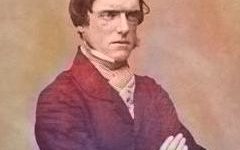




One thought on "1849: On The Government of Colonies"